Archives - Page 3
-
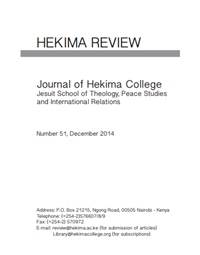
Hekima Review No. 51 (Dec 2014)
Security is a word that we hear almost daily, indicating how central it is in our lives. As put by the prophet Isaiah, the Lord always desires his people to be in peace, “My people will live in peaceful country, in secure dwellings and quiet resting places.” (Isaiah 32:18.) This wish is fulfilled through the efforts of all. “No man is built up by wickedness, but the root of the just will never be disturbed.” (Prov. 12:3). Human
security: a Theological and Peace Perspective is a move to building up roots of justice and security in today’s society. The search for and promotion of human security is the responsibility of every human person. The struggle for human security is for everyone because everyone deserves it. It is not a matter of give and take but rather a give without counting the cost. Aware now more than ever human security means much more than the absence of conflict. Inspired by the day-to-day realities that are affecting individuals, groups of persons, societies, nations, and races we reflect on the reality of human security. What in this world is promoting this important aspect of human beings and what is diminishing or affecting it negatively? -
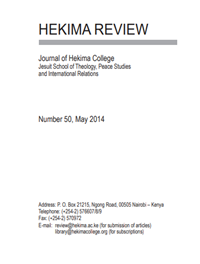
Hekima Review No. 50 (May 2014)
Lumen Gentium 11, describes the family as a domestic church. This description, in a big way, puts the family at the center of the day-to-day Christian activity. It is not easy to tell whether this important reality of the contemporary Church is in crisis or progress as each person will be judging it based on what one believes or on the trend one leans on. The liberals’ ideas will definitely differ from those of the conservatives. However, each of them is entitled to their opinion as the teaching of the Church is there to guide regardless of the trend one takes.
-
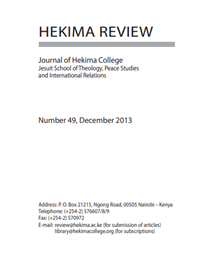
Hekima Review No. 49 (Dec 2013)
The Year of Faith came to a close on 24th November 2013. It is now time to nurture the fruits the Church has received during the year, on both personal and community levels. The Year of Faith afforded Catholics an opportunity to deepen their understanding and living out of the faith, as well as share that faith with others. During the Mass to close the Year of Faith, Pope Francis invited Christians to have Christ at the center of their lives, so that their thoughts and actions would be truly Christian. In this way, everything about the life of Christians has to find inspiration from the person of Jesus Christ. From this background, the theme for this edition of Hekima Review sought to investigate three of the most influential institutions in a Christian’s life: Church, Media, and Politics.
-
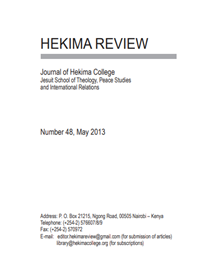
Hekima Review No. 48 (May 2013)
The theme for this edition of Hekima Review hinges on two points: faith, on one hand, and the contemporary secular society, on the other. The point on contemporary secular society is about the context in which we live. The notion of faith is an essential matter for reflection. Our decision to foreground the notion of faith finds its inspiration from three happenings: the proclamation of the Year of Faith by Pope Benedict XVI; the fiftieth anniversary of the opening of the Second Vatican Council; and the twentieth anniversary of the publication of the Catechism of the Catholic Church.
-
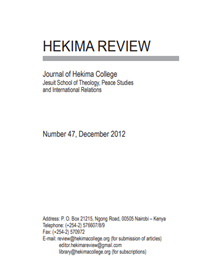
Hekima Review No. 47 (Dec 2012)
Anthony De Mello, the Indian Jesuit mystic, in his Wake Up video, tells a story of a man whose beard was on fire while the man was praying. The people around shouted to him, Mr! Mr! Your beard is on fire; your beard is on fire! The man laughed and replied; don’t you see me praying for rain? This is the irony of religion despite its power to perceive violence it can also conceal within itself the paralyzing fear, ignorance, and unfathomable stupidity to do nothing while the whole world is on fire.
-
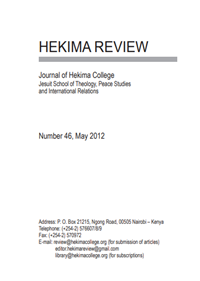
Hekima Review No. 46 (May 2012)
On the 20th of November, 2011, in Cotonou, Benin Republic, Pope Benedict XVI presented Africae Munus, the Second Post-Synodal Apostolic Exhortation on the Church in Africa in Service of Reconciliation, Justice and Peace. The “Second Special Assembly of the Synod of Bishops for Africa” took place in Rome from 4 to 25 October 2009. Africa Munus or Africa’s Commitment, as it is translated, builds on the first synod for Africa, Ecclesia in Africa. In this document, the model of the Church as a “Family of God” (EA#14) emphasized the evangelical mission of the African Church in the face of despair and discouragement. The Synod fathers dealt with a fundamental question, “What is it and what [the Church] must fully carry out, so that its message may be relevant and credible?” (EA #21). “In a Continent full of bad news, what is the Christian message ‘Good News’ for our people?
-
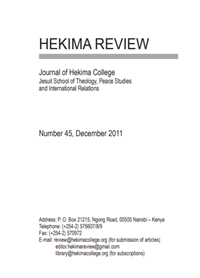
Hekima Review No. 45 (Dec 2011)
More often than not, great changes in human history have ensued from the unconscious dialogue of an individual human being with the great historical forces that have been in motion for perhaps centuries before his or her birth. The individual in question crystallizes the aspirations of his or her contemporaries and voices them, channeling as it were their spiritual energy, sparking off a movement bigger than the idiosyncrasies that initially set him or her in motion. Mohamed Bouazizi’s self-immolation on 17 December 2010 catalyzed the Tunisian Revolution and the wider Arab Spring. The manifesto of Stephan Hessel, former French diplomat, entitled Indignez-vous!, has much to do with the birth of movements such as the Spanish indignados, the French indignés, the Portuguese movement Geração à rasca, Occupy Wall Street in the United States, Y’en a marre in Senegal and a host of other movements across the globe which strive to humanize our world.
-
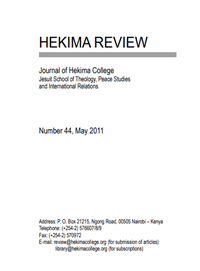
Hekima Review No. 44 (May 2011)
For centuries, biological differences between men and women have been the determining factor in the ascription of social roles. Women’s biological capacity for childbirth and breastfeeding and their general lesser physical strength have been used to confine them to domestic chores and the upbringing of children. Supposedly ruled by emotion and judged less reasonable than men, they have been deemed unfit to participate in politics, for example, and ostracised from large areas of the public arena. More often than not, decision-making has been seen as the sole prerogative of men. Even in many of the so-called democratic nations, the right of women to vote and to run for office is hardly a century old. As it stands, this biological determinism or social Darwinism has often been applied to the detriment of women, whose lot has largely been an oppressed and restricted form of life. Taken from this perspective, the feminization of the gender discourse is justifiable.
-
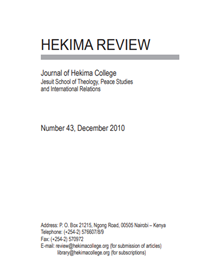
Hekima Review No. 43 (Dec 2010)
In 1987, I witnessed a serious disturbance to the quiet and ordinary life of the rural community where I was born. The community went on an all-out war with the rainmaker. The community had requested him to make rain so that the farming cycle could begin. But he could not, and could not explain why. So, the women of the community moved into the rainmaker’s homestead and cooked all the food in his barn. The saga developed over three months, and life was never the same since the drought of that year: all the able-bodied people could no longer live on farming; they had to find an alternative source of livelihood. Of course, neither the drought nor the disruption of life it occasioned made it into world news headlines. The disturbance was ‘insignificant’ to draw the attention of the media, and nobody would have made money ‘representing’ either party to the conflict in a court of law. But it has got me thinking about the environment for the past twenty years.
-
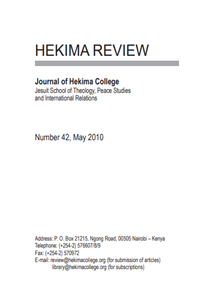
Hekima Review No. 42 (May 2010)
At a time when the world and the church are short of reasons for celebration, here is a candidate: I invite you to celebrate the priesthood in this “Year for Priests.” I recommend that we applaud especially those who are in the ministerial priesthood because, in our contemporary African society, they are like the “Fiddler on Roof” who has to balance precariously different facets of his life. Do you remember the movie with that title? In the movie, the protagonist, Tevye, is an archetypal symbol of the tension in the meeting of two cultures, western civilization as industrialization and the Jewish culture as tradition. The “invading” Western culture is daring, aggressive, and too sophisticated to be ignored. The Jewish traditions, ingrained in the cultural life of the village of Anatevka in general and in Tevye in particular, seem ill-equipped to adequately confront it.

